Share
They were bright stars that lit up the hockey firmament but now lead quiet lives. Their exploits and feats still draw the adulation of two generations of fans. Their path to success and recognition, however, was fraught with challenge, hardship and sacrifice calling for hard work, determination and resilience but it also presents many a heart-warming tale. This is second in the MY STORY Series, which is an effort to capture nuggets in the illustrious careers of these stars of yesteryear as they recollect their past, something that could well inspire GenNext bracing for challenges of their own – EDITOR
By ERROL D’CRUZ
Joaquim Carvalho, India star of the mid-1980s, needed to find reason and motivation for the demanding task of staying in contention for selection to the India team. Sure, pride and honour in wearing the India shirt and pleasure and fulfillment in playing the game he loves at the highest level provided the impetus. But it was still a challenge to retain one’s place in the squad. What finally ensured Carvalho kept at it through thick and thin was the effect of Cupid’s golden arrow. Let’s hear it from the 61-year-old himself.
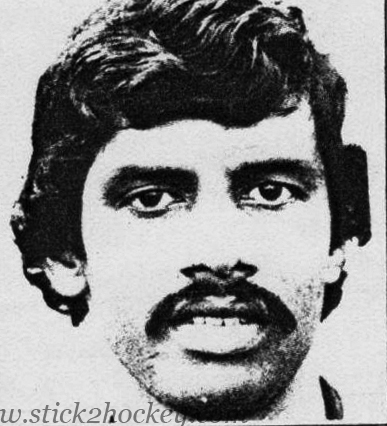
Joaquim Carvalho
“You see, I was wooing the lady in my life who was also training at the NIS, Patiala, at the time. “I had set my eyes on Vandana (Rao), who was a leading athlete at the time,” Carvalho, a robust centre-half in his hey day, says. “If I were to keep meeting her, I needed to remain part of the hockey core group for national selection so that I could stay and train at NIS, Patiala!”
Happily for Carvalho, he had more than proved his worth – both, as an India player as well as the successful suitor of the woman he married in 1991 after a decade of courtship. Reflecting on the challenge facing an India hopeful, Carvalho, who played more than 100 internationals, says, “Earning an India cap was tough. Very few make it and when one does, joy knows no bounds.”
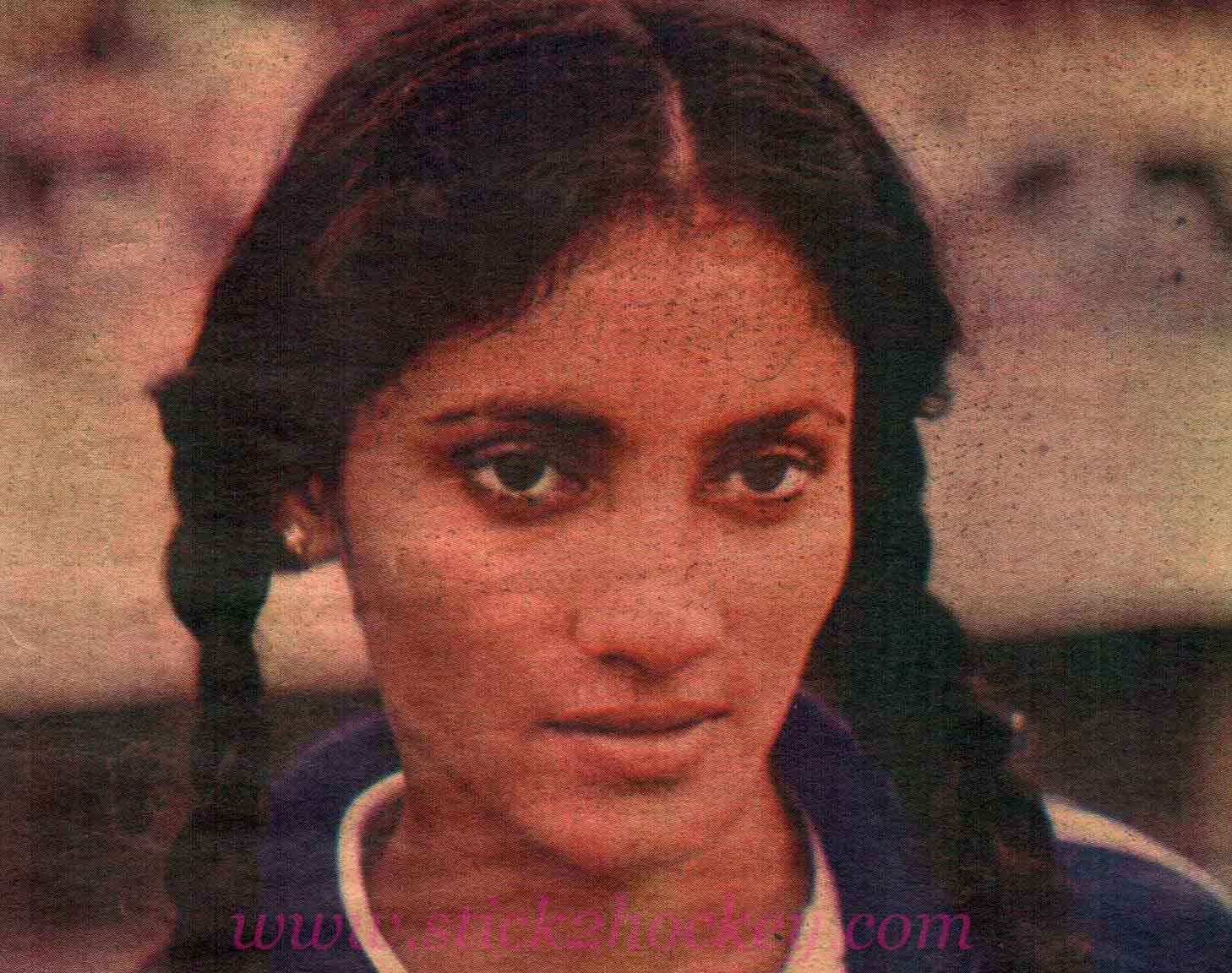
Indian Olympic athlete Vandana Rao, fiance of Joaquim. 1984
The Mumbai-raised World Cupper and Olympian reflects on his resilience when he aspired to don the coveted sky blue shirt: “I had attended so many camps. Often, it was the case of so close yet so far. For two years, I was among the stand-bys but failed to break into the team after the grind and toil in the summer heat of Patiala. Then, in 1981 I was selected for the European tour after proving my versatility at both the centre-half and left-half positions. But at the last moment I was sidelined and in came Sujit Kumar, a left-half, which took the total number of halves in the squad to five”.
“I found that unbearable and I took refuge in the shower where I daresay I shed a tear or two. And it wasn’t just me. My friend and future India teammate Somaya (also Mumbai-based) played well at camps and was surprisingly ignored for the Quadrangular in Kuala Lumpur, Malaysia, a few months before the 1980 Moscow Olympics. Returning home dejected was hard especially while travelling five hours by road from Patiala to Delhi before catching a train to Mumbai,” Carvalho recollects.
Carvalho made a pragmatic decision to skip the camp for selection to the Moscow Olympics in order to pass examinations and acquire a B.A. degree. “I believed that education should be a priority. There was always a chance to win an India cap later,” he says. Pulling out of the Moscow camp may have pegged back Carvalho’s prospects of being selected but he kept knocking on the door.
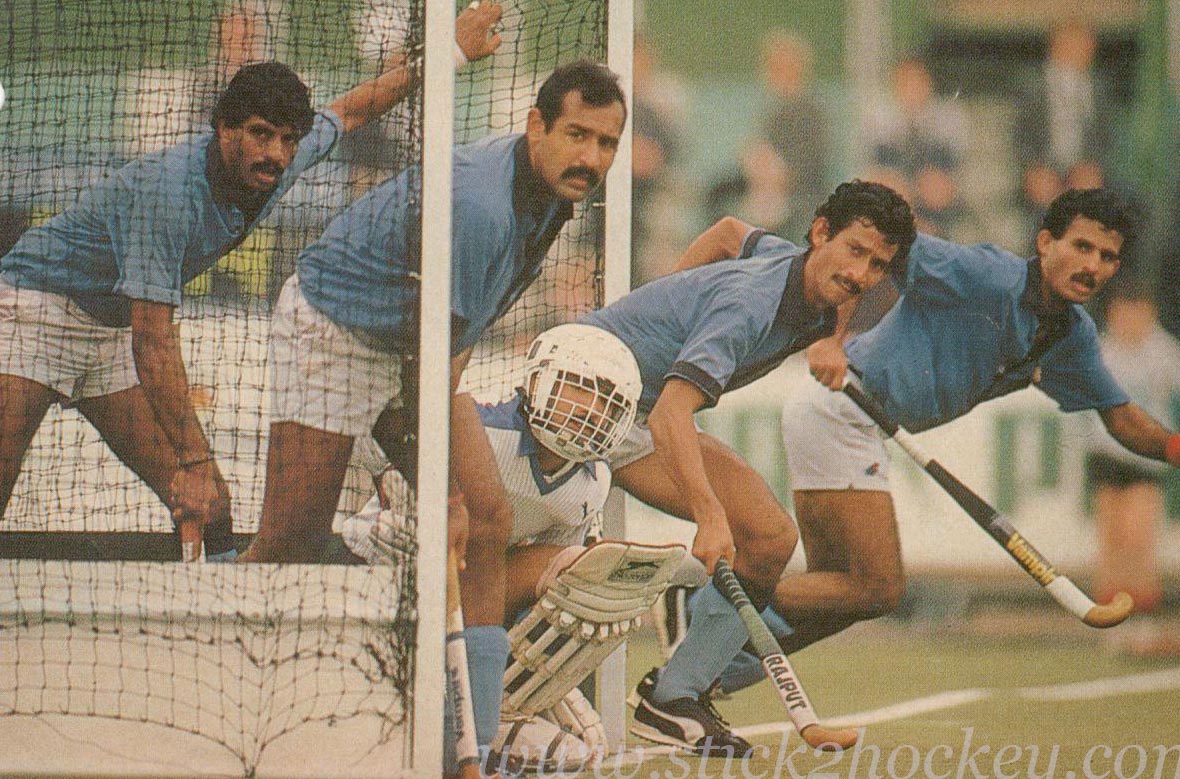
Indian defend a penalty: (l-r) Joaquim, MMSomaya, Vineet Kumar & BK Subramani
He made a huge statement at the Kolkata National championships in 1982 by scoring 11 goals that sat on a solid performance as pivot in the Mumbai team but failed to make the grade yet again. He did not lose heart. Instead swore to work harder. And he remembers encouragement from Somaya, his great rival in Mumbai school’s hockey.
“Playing an under-13 match, my strong tackle on Somaya drew a yellow card that found me spending time behind my team’s goal (as was the rule in those days). My coach who turned up late for the match strained his eyes to locate me on the pitch only to find me cooling my heels behind our goal!”
A decade later, it was Somaya providing Carvalho much needed assurance. “He told me I would get selected one day and his words helped.” The big day finally arrived when Carvalho featured in the team for the 1982 Indo-Pak series in Dubai. He shone in the series and became a regular for nearly five years in campaigns that included the Olympics, Champions Trophy, the Asian Games, the Esanda Invitational tournament and bi-lateral test series.
Carvalho experienced joy – which included a sensational 5-4 win over Pakistan from 0-3 down in the 1982 Amstelveen Champions Trophy where India picked up the bronze medal – and despair following an infamous 1-7 defeat to Pakistan in the Asian Games final the same year. “Within a fortnight we avenged that defeat at the Esanda tournament in Melbourne. That period reminds me that I was lucky to have wonderful coaches. It was Balbir Singh Senior first and then Balkishen Singh, legends both.”
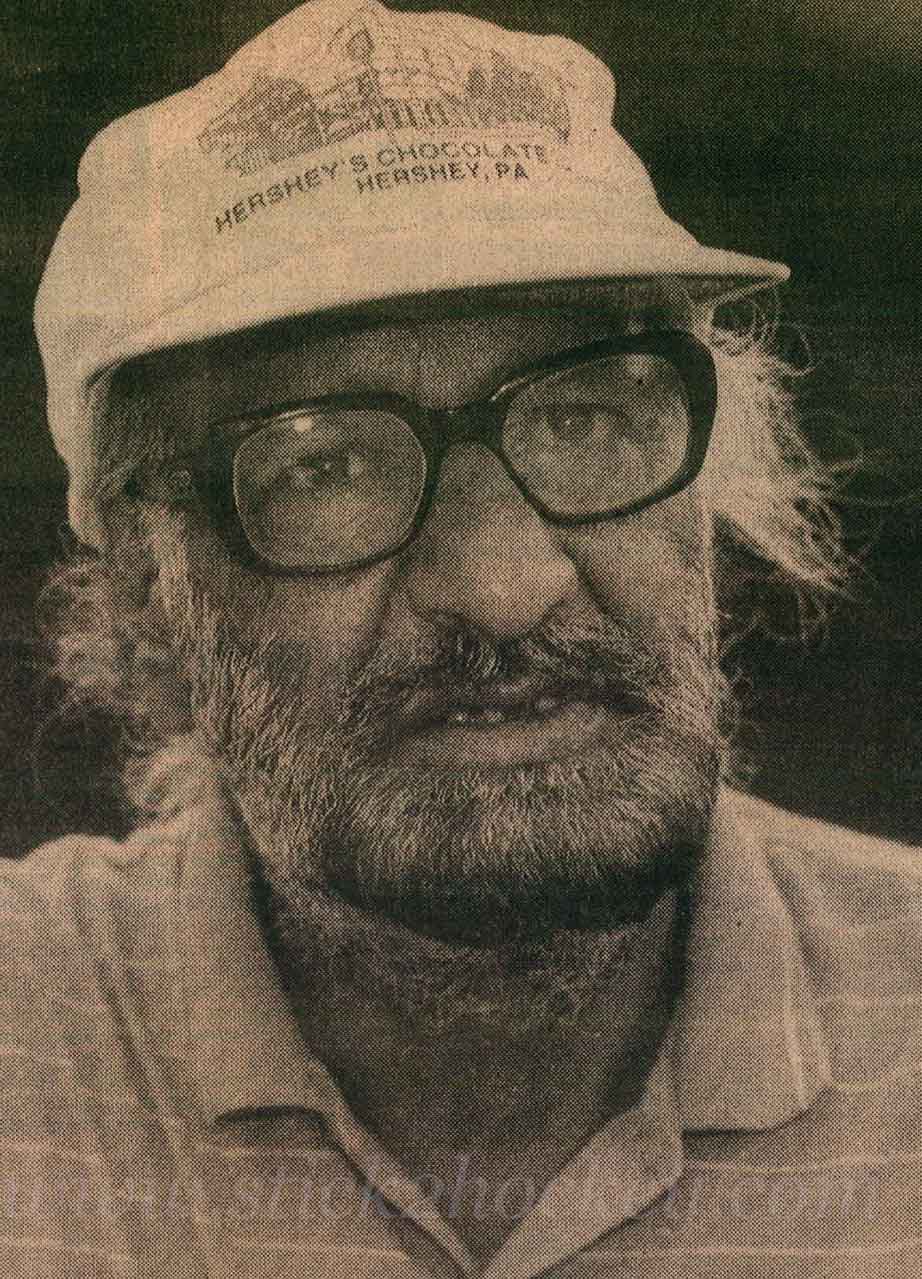
Coach Balkishen Singh
In fact, Carvalho spells out how and why he turned specialist penalty stroke taker. “A teammate missed a penalty stroke in the 1983 Azlan Shah Cup and I was the one to bear the brunt of a tongue lashing by coach Balkishen after the match. He would have wanted me to take the stroke and made it a must that I do so in future games,” Carvalho reveals.
It proved crucial, none more so than in the epic against (West) Germany in the 1985 Perth Champions Trophy where India fought back from 1-5 down to 4-5 in the last eight minutes and forced a penalty stroke with 20 seconds left. The pressure would have been unbearable for any penalty stroke taker as the German goalkeeper filibustered before taking his position under the bar. Carvalho’s cool demeanour, though, was striking. As was his execution of the stroke which drew the match 5-5.
“I was absolutely confident while taking the stroke. I was made to take some 100 penalty strokes at each practice session. Sometimes dozens of them after a match, long after the team coach left the venue for the hotel!”
There were several joyous moments in Carvalho’s diary. But there were those of despair. Against Germany, a year prior. “We did well in the build up to the Los Angeles Olympics and were going fairly well in the tournament itself. We won three matches before losing to Australia 2-4 and were up against Germany needing to win to qualify for the semifinals. It ended goalless with Zafar Iqbal, our left-winger, missing a great opportunity at the fag end. The team was shattered. We had no appetite to eat, skipped dinner and remained in our rooms,” Carvalho recalls.
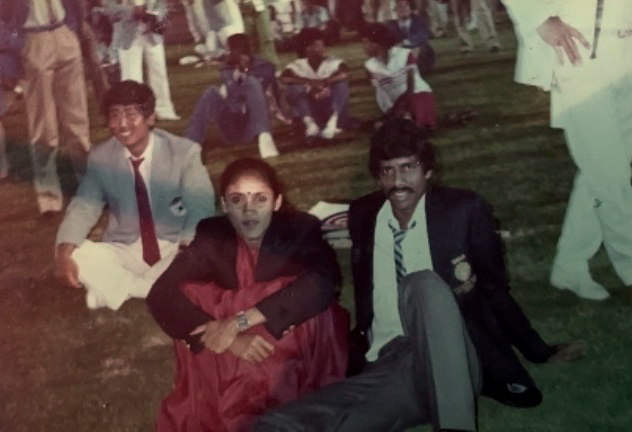
“My fiancé Vandana and her India 4×400 relay team, however, reached the final for the first time ever!
“But here I was, spending the worst day in my life.” There were other lows too. The last-place finish at the 1986 World Cup still rankles. But Carvalho reflects on the more endearing memories. Some of them amusing. Like the instance when he discussed umpiring bias with an Australian umpire. He quoted an incident in the 1983 series against Australia in Australia when India were denied a goal when right-winger Jallaludin’s attempt went in after hitting the crosspiece.
“We converged around the umpire to persuade him to change his decision. But it was only after Ric Charlesworth, the legendary Australian, stepped up to convince him that the ball did go into goal was the decision reversed. “The umpire I was conversing with was Dennis Meridith — the very official who disallowed the goal years earlier!,” Carvalho says with a chuckle.
After being ignored for the 1986 Seoul Asian Games, Carvalho was hurriedly recalled for the World Cup that followed a few days later. “The establishment realised that experienced hands were necessary for a major campaign after the disaster of the Asian Games where for the first time in history, India failed to reach the final.
“I got the news from Vandana from Seoul where she was participating. “At first I was reluctant to go but was persuaded to by Baptist D’Souza, then Bombay Hockey Association president.
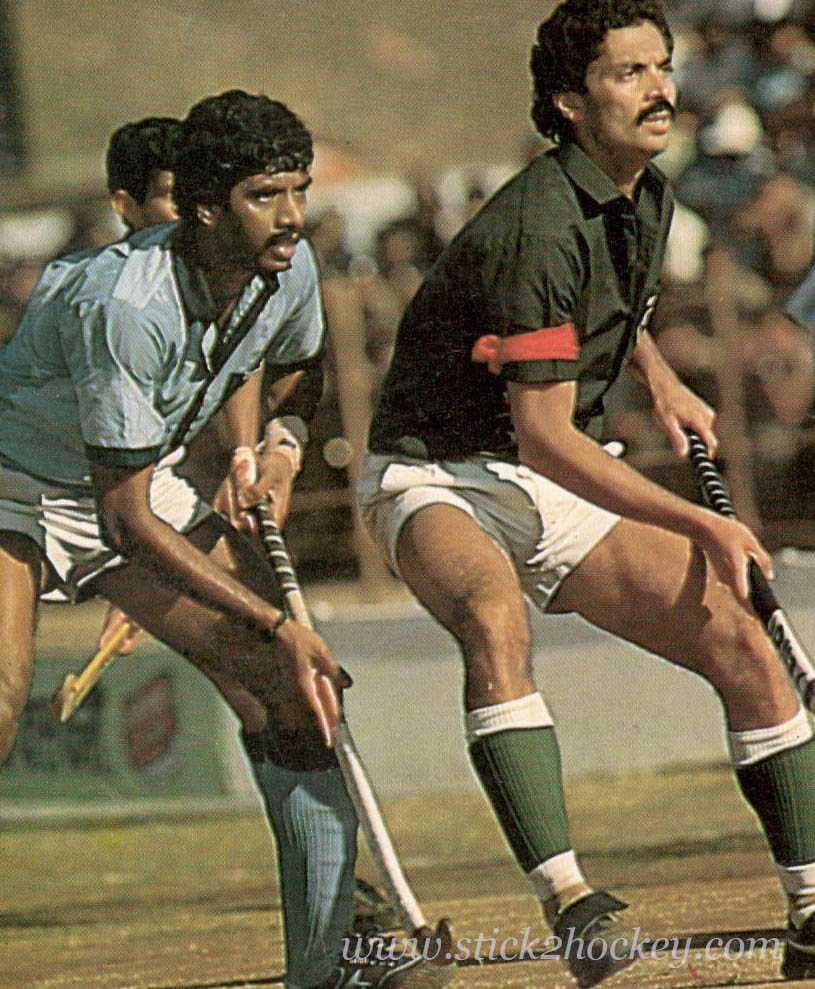
Joaquim marking Hasan Sardar in the Test Series
Pakistan ace centre-forward Hassan Sardar was also snubbed for the Asian Games but, like Carvalho, was recalled for the World Cup. “We met in London and Sardar expressed surprise to see me there,” Carvalho recounts. “I replied, saying that after marking you closely in a test series a few months ago, they recalled me after learning you were going to the World Cup!”
The team, though, was ill prepared and crashed to 12th and last position in the World Cup after which Carvalho decided enough’s enough. He quit international hockey and concentrated on his job in Mahindras whom he represented in Mumbai’s Super Division league.
“Coaching was my next phase of involvement in the game and I went abroad to Oman where I coached its national team,” Carvalho, who, like Vandana, is an Arjuna awardee, recounts.
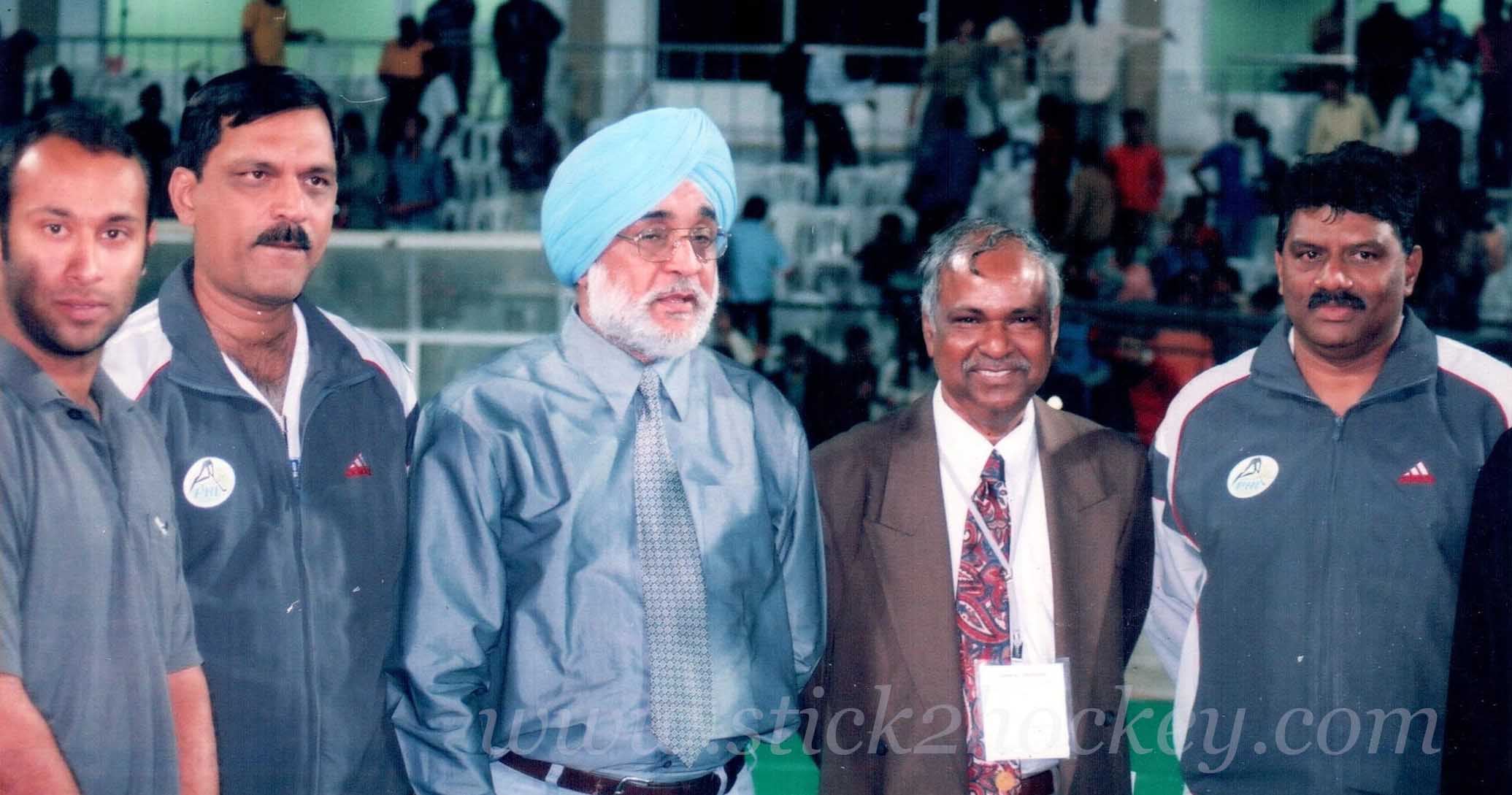
In PHL as coach: Pakistan star Mudasar Nasar, Coach Lobo, Ajitpal Singh, Admino Jesudanam and Joaquim
“Years later, I endeavoured to make a difference as committee member of the Bombay Hockey Association. Along with a group of prominent players and officials including Mark Patterson, Peter Menezes, Ranjit Dalvi, Gurbux Singh and Nanjappa, I helped bring a new floodlights facility in the place of the obsolete one at the Mahindra Stadium. “We also pressed for the replacement of the artificial surface at the venue and the upgrading of the dressing rooms,” Carvalho reveals.
As a coach, Carvalho made steady progress with the Mumbai team which he guided to the 1994 National Championship final at home. Carvalho, who opened a sports goods retail outlet in Mumbai and later in Goa, the land of his ancestors, waited patiently to fulfill aspirations of coaching the national team.
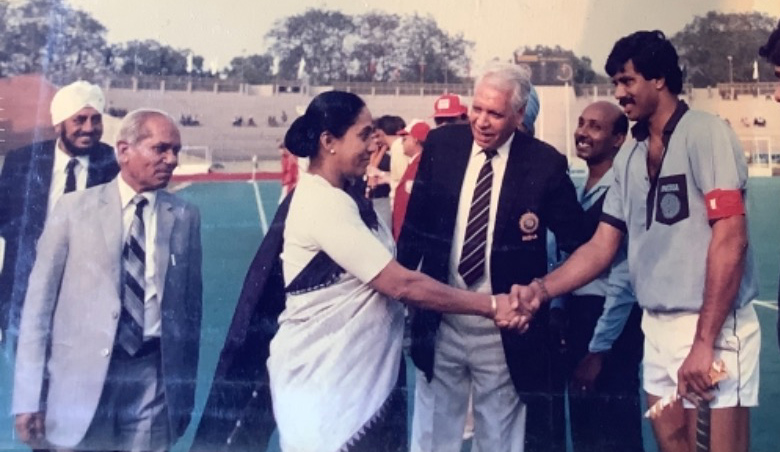
Captain Joaquim shaking hands with Sports Minister Margaret Alva, Indira Cup
“Mine was a short stint but a satisfying one. I started with the Azlan Shah in 2007 and took the team to third spot. It was a bronze also at the Champions Challenge and towards the end of the same year guided India to the winners podium in the Asia Cup. We had a good run in the year leading to the Olympic qualifiers but we lost to Great Britain in the final in Santiago, Chile, and failed to qualify for the Olympics for the first time ever. It was deeply disappointing,” Carvalho says. “But I had not flinched from accepting the post of head coach with a view to seal a spot at the 2008 Beijing Olympics.”
Carvalho remains loyal to hockey even though, as a Goan, football runs in his blood.
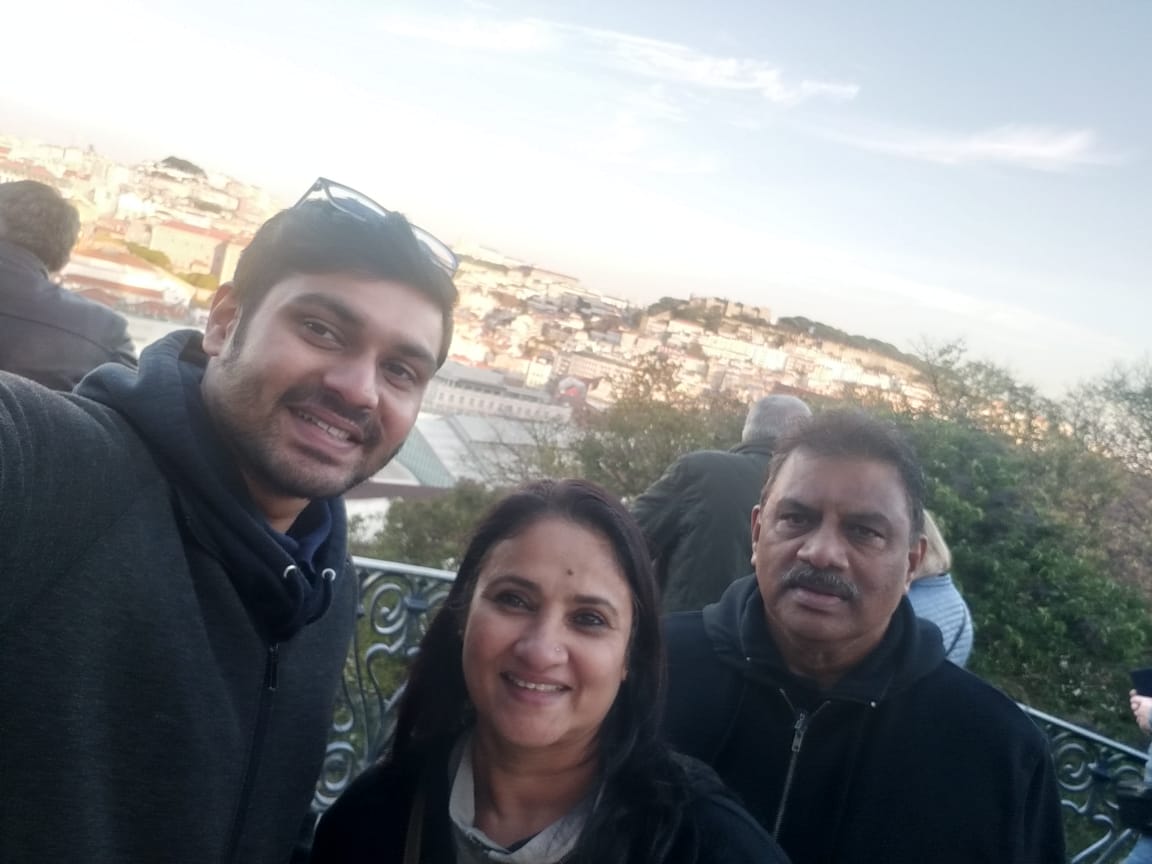
Joaquim with wife Vandana and son Akshay
“I considered myself a better footballer than a hockey player,” Carvalho reckons. “I also did pretty well in the sprints and 800m.” “But I honed my hockey skills at Ranwar Square in Bandra (a suburb in Mumbai) where five-a-side games were popular. I grew up being influenced by skilful players like Bruno Fonseca, Roque Fonseca, Desmond Fonseca, Agnelo Vaz, Wilbur Rodrigues, Freddy D’Sa and many more…”, says Carvalho, whose parents moved from Goa to Dhobi Talaob, Mumbai.
When his family moved to Bandra, he attended St Andrew’s High School before joining St Stanislaus’ – both noted hockey nurseries. Carvalho now leads a quiet life in Bandra, Mumbai, with Vandana and 26-year-old son Akshay who played hockey and football in school before concentrating on a career in management.
“I have no regrets. I have thoroughly enjoyed my hockey career. The game has given me a lot – the honour of representing my country and a good life.”
“And, oh yes… hockey also helped bring me a lovely wife.”
Photos: Carvalho Album & K. Arumugam Collection
***
www.stick2hockey.com is India’s oldest hockey website. Launched in 1999, the website, edited and owned by hockey historian and author K. ARUMUGAM, has covered all
major tournaments and events with precision. www.stick2hockey.com is the first site in the hockey world to bring viewers live text commentary and duly entered the prestigious Limca Book of Records. If vintage stories are what you are looking for, this site is the right one for you. You will also find pictures, some of them among the rarest, images of precious newspaper clippings, match reports, news breaks, interviews, features, statistics and history on a site respected by one and all in the hockey world.

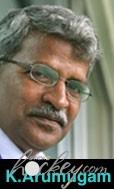 major tournaments and events with precision. www.stick2hockey.com is the first site in the hockey world to bring viewers live text commentary and duly entered the prestigious Limca Book of Records. If vintage stories are what you are looking for, this site is the right one for you. You will also find pictures, some of them among the rarest, images of precious newspaper clippings, match reports, news breaks, interviews, features, statistics and history on a site respected by one and all in the hockey world.
major tournaments and events with precision. www.stick2hockey.com is the first site in the hockey world to bring viewers live text commentary and duly entered the prestigious Limca Book of Records. If vintage stories are what you are looking for, this site is the right one for you. You will also find pictures, some of them among the rarest, images of precious newspaper clippings, match reports, news breaks, interviews, features, statistics and history on a site respected by one and all in the hockey world.

Happy to see jocquim sir , in a relaxed mood he found many talents through domestic hockey and gave to country starts like Gavin , tushar kandekar , Tyron , later years this players played & dominated domestic hockey also.
I don’t forget his iocl days
Have a great life coach
With love
Vijay Vignesh Parthiban
Strength and conditioning coach
Madhya Pradesh State women’s hockey academy Gwalior.
Nice article ! Good to know a sportspersons thoughts, trials and tribulations from the person themselves.
Best Friend and buddy (Joaquin)
My prayers to keep y in good health and happiness
Bless New Year 2021
Amazing story of success always remember watching him play at BHA God Bless you and your family
It’s a matter of great pride for us Goans what Joaquim has achieved in Hockey. A very interesting article giving us insights about his beautiful journey in the game, his hard work and determination to represent the country, will inspire youngsters undoubtedly.
There is a mention of Mark Patterson in the article which is erroneous. The Olympian keeper migrated to Australia somewhere after Seoul 1988. He wasn’t involved in Mumbai hockey administration when the new turf and floodlights were provided.
Thanks sir. We will get the clarification as shortly as possible – Editor